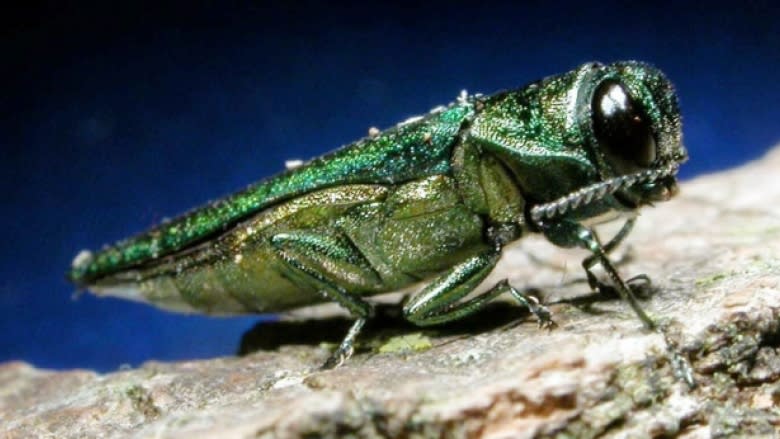Canadian-raised wasps wage war on invasive beetle
A group of Canadian researchers say that for the first time they have successfully raised wasps that could help save some forests from an invasive beetle.
Natural Resources Canada is rearing their own wasp warriors to fight the battle against the spread of the emerald ash borer beetle population.
The ash borer beetle is native to China and was detected for the first time in North America in 2001.
"It's an extremely destructive, invasive beetle. It basically kills all ash trees that it encounters as it continues to spread across North America," Krista Ryall, a forest ecological entomologist with Natural Resources Canada, told CBC Manitoba's Radio Noon on Tuesday.
"They estimate 99 or more per cent of ash trees are killed within the first few years of this beetle arriving in an area."
The beetle has been found throughout Ontario and Quebec and has been confirmed in 21 states in the U.S., according to Natural Resources Canada.
With the devastating spread of the beetle, the United States Forest Service went to China to study what else in the beetles' original environment was killing the species, Ryall said.
That's where Tetrastichus planipennisi, a parasitic wasp, was found. The wasp species only likes to lay its eggs in the larvae of the emerald ash borer beetles.
"It doesn't even want to attack related insect species," Ryall said.
"There is no human health risk whatsoever. They are not your typical wasp that you think of, they don't bite or sting. They are very tiny and you would never even know that they were there otherwise."
The wasps were brought into the U.S. a few years ago, and research shows they are winning the battle against the beetle.
The U.S. Forest Service began providing the wasp to their Canadian counterparts in 2013. But now a wasp army is being raised through a bio-control program at a laboratory in Sault Ste. Marie, Ont., to fight the destruction of millions of ash trees by the beetle.
"It's a little bit too early to say what kind of impact they may have but what we are hoping is that it becomes part of a long-term program to help reduce the beetle populations to lower levels," Ryall said.
Ryall added there is rigorous testing before any wasps are released to try to ensure they won't negatively impact the environment.
Emerald ash borer beetles are expected to continue spreading in Canada through flight and by the movement of things like firewood and other wood products, according to Natural Resources Canada.
Ryall said it's not known what that will mean for Manitoba's ash trees, but they are looking into a different wasp in case the war moves west.
"There are different species of wasps that we are also studying and one of them is originally from the Russian far east and a very cold tolerant species," she said.
"So we are trying to get permission to import that to Canada … that may be an option for somewhere that's a bit colder, like Manitoba."



